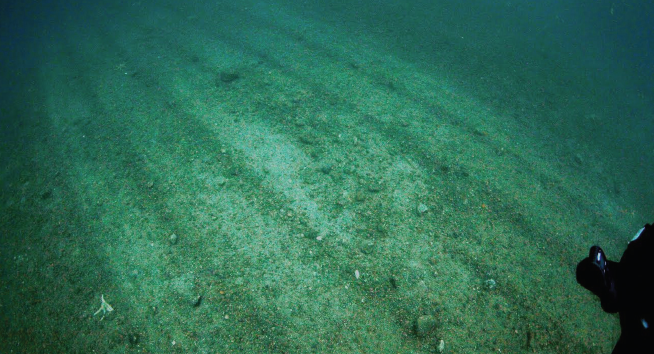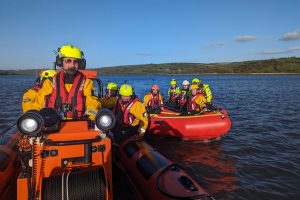
IN AN ANNOUNCEMENT that shocked many people across Wales and beyond, the Welsh Government approved a return to scallop fishing in Cardigan Bay. Five years ago, Cardigan Bay was designated a special area of conservation (SAC), and commercial scallop fishing was suspended. Acting on the results of two year study, however, the Welsh Government has decided to permit dredging in some areas of the SAC, claiming it will not have a negative effect. New guidelines are intended to ‘maximise the fishery’ while protecting the site, goals which critics say are incommensurable. Scallop dredging in Cardigan Bay will be self-regulated by the fishing industry via an advisory board that will report to government, reviewing the situation annually.
Environment and Rural Affairs Secretary Lesley Griffiths stated that there was no new evidence to suggest this fishery would have an impact on the protected features within the bay. She said: “I have decided we should not stand in the way of economic activity. I want to reassure everyone this will be a carefully and proactively managed fishery, with the number of fishing boats being monitored. I am reassured the proposed new flexible approach is proportionate and will enable us to consider appropriate areas and management mechanisms for the future of this fishery.”
UNDERWATER DESERT
Commercial scallop ‘fishing’ is a misnomer as the process involves bottom dredging, which has a disastrous effect on the ecology of the seabed. Dredging involves towing a heavy scraper along the sea bottom, in this instance to collect scallops.
When ‘the dredge’ is winched up, the scallops are taken and the rest of the ‘catch’ rejected. Writing about Cardigan Bay, Hannah Lawson notes that: “Newhaven dredgers are commonly used around the UK and have a ‘rake’ that is dragged through the surface of the seabed, collecting the scallops in a chain-mail basket. The scallop dredging completely rakes clean the seabed, destroying the species and habitats that are in the way; such as soft corals, sponges, seaweed, sea anemones, and biogenic reefs. The dredging can destroy the physical structure of the seabed and community structure within the sediment.”
As previously reported in the Herald, Greenpeace skipper Mike Fincken has campaigned against dredging in the Artic. Using special hi-tech cameras and drone technology, the images recorded on his voyage reveal the seabed after dredging to be what Mike describes as ‘an underwater desert’. Following the announcement this week, Captain Mike Fincken told us: “I consider the dredging of Cardigan Bay a crime against future generations and any one implicit in the granting of licences must be held accountable.”
JEWELS IN THE CROWN
Ceredigion Green Party have responded to the Welsh Government’s decision, expressing deep disappointment. A spokesperson, Julie Makin, told The Herald: “We share the concerns of more than 30,000 people who signed Mick Green’s ‘Save Cardigan Bay’ petition. Whilst we are still members of the EU, the Special Areas of Conservation status needs to be upheld, and we believe dredging and trawling to be incompatible with that. Ceredigion Green Party will be fighting hard to keep the Special Area of Conservation (SAC) status intact after Brexit so that the marine life of Cardigan Bay will be protected for future generations to come.”
Wales Green Party leader, Alice Hooker-Stroud, said: “The Bae Ceredigion and Pen Llŷn a’r Sarnau Special Areas of Conservation should be jewels in Wales’ crown as the UK’s largest breeding ground for dolphins. But the Welsh Government have given the go ahead for allowing damaging scallop dredging in these areas. The Wales Green Party would ban beam trawling and dredging, and protect these areas properly.”
Kerry Lewis, a lecturer in the Law School of Aberystwyth University, gave The Herald her opinion on the legality of the government’s move: “Cardigan Bay is a Special Area of Conservation. Any proposed changes to the fishing regime within that protected area is a ‘plan or project’ and subject to a Habitats Regulations Assessment. It is clear that dredging is a highly destructive activity and the onus will be on the Welsh Government to demonstrate that it is not likely to have a significant effect on the designated features of the site. If it is likely to have a significant effect, it should not be permitted unless it is clear that the project will not adversely affect the integrity of the site.”
DISBELIEF AND DISAPPOINTMENT
The Whale and Dolphin Conservation (WDC) expressed disbelief and disappointment over the Welsh Government’s decision to open up further protected areas of Cardigan Bay to scallop dredging, which they deem ‘a highly destructive method of fishing’. WDC is ‘the leading global charity dedicated to the conservation and protection of whales and dolphins’. The area of Cardigan Bay concerned is designated as a SAC due to its importance as a habitat for bottlenose dolphins. It is also proposed as an SAC for harbour porpoise.
A spokesperson for WDC, Mick Green, told The Herald: “The dredging destroys almost everything, smashing the seabed life forms to pieces and quickly reducing a rich ecosystem to a sandy or muddy desert. WDC believes that, whilst trials for new management measures to help develop a more sustainable scallop fishery are welcome, they should not be carried out in such a sensitive, protected area.” WDC is also very concerned that no account has been taken of the possible impact on harbour porpoise populations. The UK Government is currently being prosecuted in the European court of justice for its failure to designate sites for this species.
Mick Green added: “We are very disappointed that the Welsh Government have decided to ignore the robust scientific evidence we have provided, and to ignore the views of over 30,000 people who signed a petition against developing this fishery within a protected area. The SAC has been shown to be in an unfavourable state and we believe that work should focus on remedying this before any new fisheries are opened.”
‘WORTHLESS PARASITES’
In a blistering rebuke of the decision to resume dredging, naturalist and TV presenter Iolo Williams said: “I am appalled that the Welsh Government, who are supposed to have sustainability at the heart of all their work, can contemplate opening up a protected area to such a destructive fishing method.” On his Facebook page, Iolo Williams wrote: “I’m dismayed but not surprised that this bunch of worthless parasites has, once again, supported the destruction of an internationally important wildlife site. This does NOT support local, sustainable fisheries. It opens the door for ploughing the sea bed on an industrial scale.” As well as condemning those who made the decision, Iolo Williams criticised Natural Resources Wales (NRW): “This is a spineless body that continually refuses to fight for our wildlife. It’s a bleak time for nature conservation in Wales but we will keep on fighting!” The Welsh Government declined to respond to Iolo Williams’ criticisms.
CORRUPT POLITICS
Writing in The Guardian in November 2015, in the wake of the Welsh Government launching the consultation on reopening sections of the SAC to scallop dredging, environmentalist George Monbiot pointed out that the dolphins in Cardigan Bay are Britain’s largest breeding population: “People come from all over the country to watch them and experience something unavailable almost anywhere else in Britain: encounters with megafauna.” George Monbiot criticised Elin Jones, then Minister for Rural Affairs, who took the original decision to allow scallop dredgers into the SAC.
Commenting on the announcement by Lesley Griffiths on Wednesday (Nov 2), George Monbiot told The Herald: “This decision makes a mockery of the Welsh Government’s claims to be green. It damages the country’s national heritage on behalf of a tiny lobby group, largely composed of fishermen not based in Wales. This is a classic example of what I see as corrupt politics: governments placing the interests of a tiny but influential economic sector above those of the wider public.”
A report from Bangor University supports controlled scallop fishery in the SAC, suggesting that the areas of the seabed recover relatively quickly. This claim has been rubbished by a leading authority on marine conservation, Professor Callum Roberts at the University of York: “This is a dreadful piece of science. Imagine that you stop cutting the lawn for five years. Would you have a highly biodiverse oak forest at the end? No, it would be a scrappy patch of weeds. Protect a heavily dredged piece of seabed for five years and you will have the underwater equivalent of weeds. We lost the oak forests long ago – i.e. the seabed encrusted with fabulously diverse communities of invertebrates and coralline seaweeds that built up over centuries. All that is left today is muddy bottom with scattered rocks and the odd horse mussel.” Objectors to the government decision, including the WDC, will review the Welsh Government’s full statement before deciding future actions.
The ‘Save Cardigan Bay!’ petition remains open for signatures – www. change.org/p/welsh-government-save-cardigan-bay.

















Add Comment